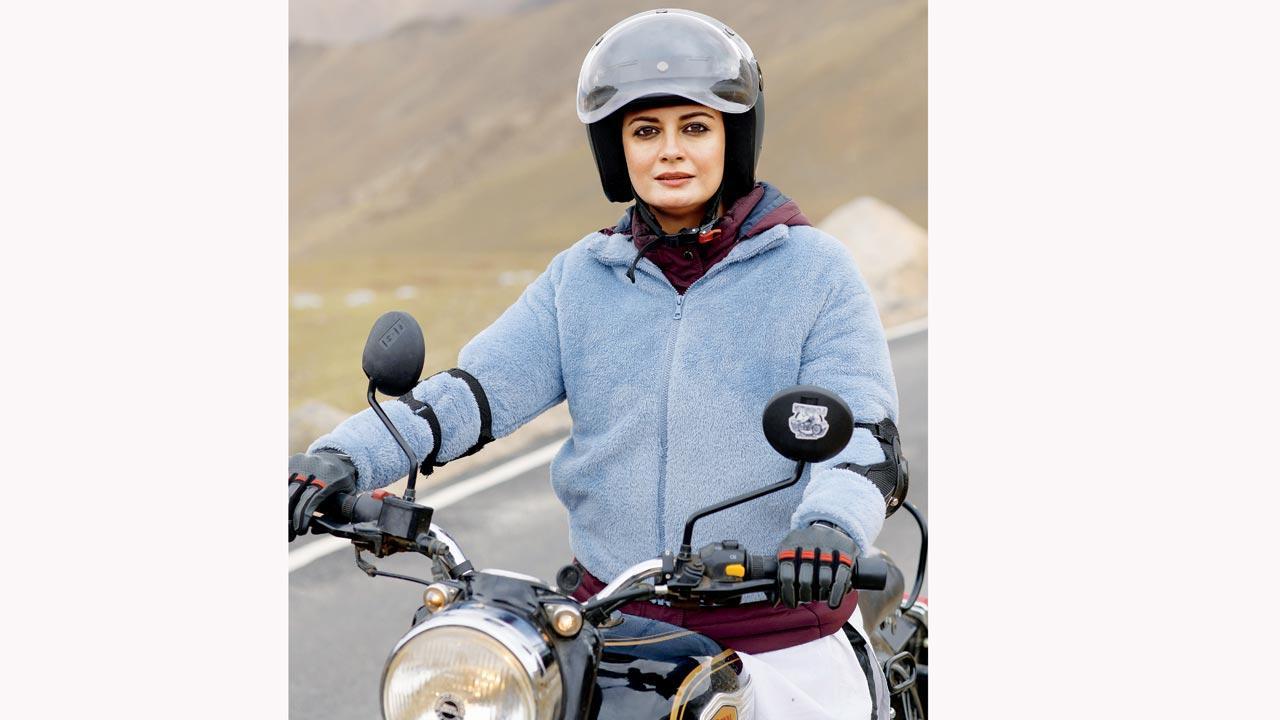The actor-producer just learned to ride, and is telling all women to hop on—age no bar, fear be damned

Mirza says it was a lifelong dream of hers to learn how to ride as she used to go for rides with her late father in Hyderabad when she was nine years old
I was super excited when I heard I had to ride a motorbike in Dhak Dhak. It would mean that I could overcome a fear, and also fulfill a lifelong dream,” says Dia Mirza, who at 41, learned how to ride a geared two-wheeler for the road trip movie.
In the film, which released last week, four women set out on a journey of self-discovery through the highest motorable pass in the world, Khardung La in Ladakh. The cast also includes Ratna Pathak Shah, Fatima Sana Shaikh, and Sanjana Sanghi, and has been produced by Tapasee Pannu.
Striding the two-wheeler revived memories of Mirza’s late father. She was born in Hyderabad to a German father and a Bengali mother; Frank Handrich passed away when she was just nine years old. “I remember sitting with dad on his bike, holding him,” she says, “I was very young then, and ever since he passed, I’ve wanted to ride. But I’ve never even tried… maybe I was scared. So, this was an opportunity I couldn’t miss. It was also a powerful story about women searching for freedom, so it all tied in well together.”
In his cult 1974 book, Zen and the Art of Motorcycle Maintenance, author Robert M Pirsig writes, “The real cycle you’re working on is a cycle called yourself.” Mirza would concur. “We learnt how to find our centre of gravity, handle the weight, the theory of brake and clutch, how to shift the gears… but it’s been a lot about inner work [too].” The first day Mirza faced the machine, a Royal Enfield 350 cc, she was intimidated by its size. Understandably. It weighs about 180 kg. “As a part of the script… I play a mechanic… I had to lift the bike to put it on the main stand. Fatema had to do it to. It took a lot of strength, and I had aches and pains for a while. I even strained my wrist. I discovered muscles I never knew I had,” she laughs. She’s never been more grateful to her fitness regimen. “Yoga and strength training are important if you want to even attempt this,” she says, “Flexibility and strength. Ratna has been doing yoga for years now, so whenever she fell, and she fell a lot, she would spring back [up]!”
Soon, the entire cast got the hang of it. “Once you are on the bike, balance comes naturally. We started riding in 48 hours, but trained for a month and kept riding every chance we got. We had to get used to the traffic, bumps… It’s all about building confidence.”
Process aside, Mirza links taming the motorcycle to your state of mind. “The first thing is to overcome anxiety,” she says, “Balance depends on your heartbeat—if its slower, you balance better. So one needs to just believe.”
And of course, the whole cast always wore safety gear.
We have to ask here—once all is done and they are riding—does it feel meditative? “You said it,” she responds quickly, “It was meditative. We were in Ladakh, surrounded by infiniteness, feeling extremely finite. There’s a sense of oneness with nature…. I would think that’s how you feel when you fly. It’s an open experience… all the elements are accessible to you. You feel the wind, rain, and terrain… it’s humbling.”
Mirza says the whole adventure of getting atop a bike is different for women. “It’s always been linked to masculine strength. When we get on a motorbike, I feel we are overcoming intergenerational inequality and fear. It’s just so liberating. I think everyone who watches this movie should draw inspiration to [overcome their fears and] pursue their potential. Anything is possible at any age, at any stage. Nothing empowers you more than yourself.”
 Subscribe today by clicking the link and stay updated with the latest news!" Click here!
Subscribe today by clicking the link and stay updated with the latest news!" Click here!








